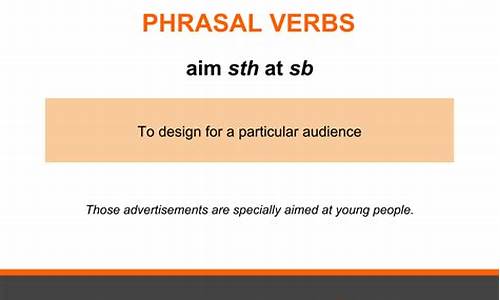您现在的位置是: 首页 > 相关资讯 相关资讯
aim sth at sb_aim sth at sb造句
ysladmin 2024-07-14 人已围观
简介aim sth at sb_aim sth at sb造句 aim sth at sb是一个值得探讨的话题,它涉及到许多方面的知识和技能。我将尽力为您解答相关问题。1.介词短语2.aims at后面跟动词什么形式3.aim几个短语
aim sth at sb是一个值得探讨的话题,它涉及到许多方面的知识和技能。我将尽力为您解答相关问题。
1.介词短语
2.aims at后面跟动词什么形式
3.aim几个短语具体是怎么用的?
4.___?aim?at providing a platform there students
5.在线等英语填空,要原因

介词短语
介词短语
介词和动词的固定搭配:
同一动词和不同介词的搭配:
look at (看) look for (寻找) look after (照顾) look over (检查) look (a)round (环视) arrive in +大地方 (到达) arrive at+小地方 (到达) hear of (听说) hear from (收到……的来信) spend +钱+on sth (花钱做某事) spend+时间+(in) doing sth. (花时间做某事)
同一介词和不同动词的搭配:
ask for (要求) leave for (动身去) send for (派人去请) pay for (付钱) wait for (等待) agree with sb (同意某人) begin with (以……开始) help with (在……方面帮助) catch up with (赶上) get on / along with (与……相处) make friends with (与……交朋友) play with (玩……)
其它的介词和动词的搭配:
listen to (听) come from (来自……) fall off (从……上摔下) try out (试验) knock at / on (敲) prefer…to… (比起……来还是……好) learn by oneself (自学) take care of (照顾) stop…(from) doing (阻止……做某事) help oneself to+食物 (随便吃……) fill…with… (在……里装满/充满) laugh at (嘲笑) worry about (为……担心) write to (写信给……) try on (试穿,试戴)
介词和形容词的常见搭配:
be good at =do well in (在……方面好) be weak in (在……方面差) be good for (对…有益) be bad for (对……有害) be late for (迟到) be sorry for (为……遗憾,抱歉) be full of (充满) be busy with (忙于……) be angry with sb. (对某人生气) be angry at/about (for doing) sth. (对某事生气) be afraid of (害怕) be interested in (对……感兴趣) be different from (与……不同) be strict with sb. (对某人严格) be strict in sth.(对某事严格) be famous for (因……而闻名) be/ get ready for (为……作好准备)
许多介词和名词的固定搭配中不用"the"等限定词:
by bike/car/bus/train/plane/air/land/road etc.
on foot (步行) at night (在晚上) at work (在工作) at breakfast/lunch/supper (在吃早,午,晚饭) day after day (一天又一天) at times (有时) in surprise (惊奇地) on fire (着火)
1 WITH
(1)v+with
(a) v+with
begin, mix, agree, deal, fight, meet, play, quarrel, do, fool, reason, correspond, comply, settle,
(b) v + sth (sb) + with + sth (sb)
compare, provide, supply, feed, replace, combine, equip, furnish,
(2)adj+with
angry, strict, pleased, busy, covered, satisfied, filled, wrong, wild, crowded, connected, popular, covered, patient, annoyed, acquainted, delighted, confronted, content, friendly, identical, frank, concerned, bored, afflicted, associated, blended, burdened, comparable, consistent, disappointed, displeased, endowed, enraged, exhausted, familiar, gifted, impatient, infested, intimate, irritated, level, moved, occupied, overcome, popular, satisfied, vexed
(3) n+with
acquaintance, alliance, trouble, talk, chat, connection, consultation, conversation, sympathy,
2 AT
(1)v+at
aim, point, snatch, wonder, strike, work, look, glance, laugh, run, catch, shoot, stare, glare, thrust, smile, call, fire, tear, knock, winder, arrive, come, gasp,
(2)adj+at
amused, delighted, angry, good, surprised, astonished, pleased, terrified, clever, alarmed, astonished, clumsy, disgusted, impatient, quick, startled, surprised,
(3)n+at
knock, pull, look, glance, smile, game, astonishment, surprise, alarm,
3 IN
(1)v+in
get, lie, turn, draw, believe, share, take, drop, give, call, hand, succeed, bring, result, trade, involve, check, count, cut, indulge, pour, participate, intervene, fill,join, confide, trust, believe, persist, consist,
(b) V+sb(sth)+in
help, spend
(2)adj+in
rich, interested, active, disappointed, engaged, busy, weak, expert, successful, absorbed, skilled, concerned, experienced, confident, employed,accurate, clothed, diligent, negligent, proficient, prompt, versed,
(3)n+in
interest, progress, satisfaction, faith, belief, confidence, response, pride, perseverance, harm, difficulty,pleasure, confidence, delight,
4 FROM
(1)V+from
(a) V + from
learn, die, come, suffer, hear, fall, rise, hang, escape, date, depart, result, descend, refrain, abstain, differ, distinguish, derive, expel, conceal, judge
(b) V + sth ( sb) +from + sth ( sb or a place)
borrow, protect, receive, separate, keep, stop, prevent,deter, choose, remove, save, dissuade, excuse, restrain
(2)adj+from
different, far, tired, made, separate, absent, distinct, hidden, made,
(3)n+from
letter, visitor,absence, difference, protection, relief, rescue,
5 OF
(1)V+of
(a) V+of
consist, dream, hear, tell, think, know, talk, die, speak
(b) V+sb+of+sth
rob, warn, inform, remind, accuse, cheat, convince, relieve, deprive,
(c) V+sth+of+sb
ask, beg, demand, require,
(2)adj+of
aware, careful, free, short, sure, certain, worthy, afraid, hopeful, proud, full, tired, made, capable, impatient, considerate, characteristic, guilty, capable, composed, jealous, ashamed, envious, ignorant, apprehensive, bare, cautious, clear, composed, conscious, descriptive, exclusive, forgetful, fond, hard, incapable, informed, innocent, made, mindful, neglectful, observant, possessed, productive, regardless, rid, sensible, sick, susceptible, weary
(3) n+of
quality, number, sample, choice, impression, neglect, attack, care, consideration, pleasure, doubt, way equivalence, possibility, example,
6 ON
(1)v+on
(a) v+on
act, lean, live, work, depend, look, wait, turn, switch, pull, have, keep, call, put, push, speak, insist, push, collaborate, count, frown, reckon, speculate, figure, carry,
(b) V+sb(sth)+ON+sb(sth)
congratulate, spend, base, fix
(2)adj+on
hard, keen, dependent, based, impressed,
(3)n+on
book, discussion, lecture, advice, opinion, impression, attack, dependence, judgment, pity, mercy, authority
7 TO
(1)v+to
(a) v+to
listen, stick, refer, turn, point, reply, occur, attend, see, lead, happen, come, get, write, hold, agree, belong, adapt, attribute, object, subscribe, adjust, accede, yield, resort, relate, respond, testify, succumb,
(b) v+to+sb
announce, describe, explain, express, mention, report, say, shout, suggest, whisper, speak, talk, nod,
(c) v+sth(sb)+sth(sb)
devote, compare, add, introduce, invite, leave, join, reduce, sentence, carry, take,
(2)adj+to
equal, opposed, true, familiar, close, near, kind, harmful, polite, rude, similar, useful, married, known, used, good, dedicated, fair, essential, parallel, related, sensible, relevant, possible, indifferent, devoted, comparable, necessary, contrary, suitable, strange, close, alike, opposite, familiar, inferior, superior, proportionate, accessory, accustomed, adapted, addicted, adequate, adjacent, afflicted, akin, alive, amenable, applicable, attentive, awake, blind, common, conductive, congenial, contiguous, contrary, corresponding, deaf, derogatory, disagreeable, displeasing, distasteful, exposed, false, fatal, grateful, hostile, important, indifferent, loyal, moved, obedient, odious, opposite, painful, partial, peculiar, pleasant, precious, preferable, precious, prior, profitable, prone, proper, relative, relevant, sacred, strange, subsequent, susceptible, thankful, troublesome,
(3)n+to
key, answer, visitor, end, way, solution, traitor, attention, exception, gratitude, approach
8 FOR
(1)v+for
(a)v+for
account, beg, hope, send, look, ask, long, pay, wish, wait, leave, fight, plan, prepare, care, stand, search, answer, run, call, bargain, inquire, press, apply, provide, apologize,grieve
(b)v+sb+for+sth
ask, blame, forgive, pardon, pay, praise, punish, reward, thank, excuse,
(2)adj+for
eager, bad, good, famous, fit, suitable, ready, sorry, grateful, useful, late, responsible, proper, crucial, competent, eligible, noted, renowned, appropriate, notorious, convenient, possible, profitable, liable, necessary,anxious, bound, eligible, impatient, liable, sufficient, uncared, unfit, zealous,
(3)n+for
plan, need, reason, explanation, ability, affection, excuse, ambition, anxiety, reputation, consideration, necessity, talent, sympathy, cause, pretext,qualification
9 ABOUT
(1)v+about
quarrel, agree, consult, complain, speak, bring, think, set, care, fumble, fuss, leave, move, lie, hear,speculate, inquire,
(2)adj+about
happy, anxious, nervous, cautious, careful, certain, excited, particular, pleased, concerned, enthusiastic,uneasy, troubled
(3)n+on
concern, anxiety, opinion, question,
常见的英语动词短语搭配
1) Make
make steal, laws, friends, research, much progress, great effort, some tea, some noise, contribution, war, peace, model ships, money, love, no condition, confidences, remarks, faces, clothes, profit, some trouble, sense, difference,haste, room, one's way, dinner, fun, preparations, sail,
make an excuse, offer, experiment, observation, impression, answer, advance, attack, attempt, exam, investigation, explanation, arrangement, appointment, application, an error, exchange, invitation, accusation, enquiry, improvement, outline, oath,approach, entry, exception,
make a statement, sketch, complaint, charge, journey, request, beginning, compromise, bargain, comment, copy, criticism, correction, difference, discovery, fortune, haste, survey, jump, sacrifice, demand, study, guess, visit, call, slip, shave, bed, mistake, fire, speech, walk, vote, haste, plan, will, living, recommendation, reduction, decision, promise, reference, poem, sentence, suggestion, habit, demonstration, summary, comparison, preparation, choice, joke, reply, resolution, face, noise, check,record, railway, canal, trip, cake, law, meal, face, guess, contrast, policy,mends, change, bow,confession, move, point, price, sound, stand, word,
2) Have
have breakfast/lunch/supper, tea, sports, labor, patience, deep affection on, power,fun, difficulty, notice,
have a meal, drink, beer, wine, coffee, taste, smoke, discussion, meeting, talk, chat, fight, walk, quarrel, run, ride, debate, break, haircut, swim, shave, wash, try, rest, lesson, class, wish, dream, song, shock, game, dance, stomachache, toothache, headache, backache, cold, cough, pain, fever, holiday, day off, good time, lie, good appetite, care, chance, disagreement, shower, sleep, test, baby, fit, good appetite, picnic, sale, share, mercy, choice,
have an appointment, influence, exam, interview, objection,
have the advantage, the day off,
3) Do
do justice to sb (do sb justice), good, harm, damage, honor, wrong, evil, right, dictation, translation
do drills, exercises, house work, home work, research (work) service, sums, physical labor, business, gymnastic,wonders, honours, battle, credit, justice, English puzzles, questions and answers, sport
do a room, favor, test,job,subject, sum, show
do an experiment,
do one's lesson, assignment, hair, teeth, nail, bed, duty, best,need, part, bit
do the problem, day shift,food, room, house, trick, deed
do some washing, reading, shopping, sewing, cleaning, sightseeing, traveling, cooking studying, sweeping, speaking
4)Take
take measures, steps, orders, treatments, some pictures (photo), notes, advice, some medicine, poison,some tips,sides, action, aim, aside, apart, breath, effect, notice, offence, shape, turns, time, some rest
take a walk, chat, bath, shower, course, plane, nap, look at sth, journey, bus, taxi, lift, dictation, deep breath, day off, seat, newspaper, degree, risk, job, hint, subject,life, hike, beating, bow, chance, holiday, vote,
take an exam,oath,
take one's choice, seat, place,chance, fancy, time,
take the sun, chair, first place,blame, air, head,
5) Give
give a ring, push, pull, kick, smile, cry, sigh, shout, laugh, shrug, welcome, concert, lecture, punch, reply, course, description, blow, definition, kiss,demonstration,hand, raise,
give trouble, help, offence, pleasure, encouragement, permission,respect, support,chase,
give an excuse,order, example,
give sb a rise, hand, lift,
6) Go
go broke, bust, Dutch, easy, mad,round,
go for a drive, run, swim, walk, song, an outing
go climbing, dancing, fishing, hunting, riding, skiing, skating, swimming, walking, shopping, shooting,
go to school, college, bed, hospital, church, court, sea, town, work, war,
go to a concert, a report,
7) Keep
keep secret, quiet, dogs and cats, house,faith, silence, watch
keep an account, an arrangement,
keep a promise, shop, house, family, diary, balance, seat,
keep one's temper, word,
keep the rules, the score,
8) Set
set sail, words to music, fire, foot in a place,
set an example, an exam paper,
set one's watch, head at rest, eyes on sth,
set a tone, speed, price, style, seal to, demand, date, trap, paper,
set the fashion, pace,
aims at后面跟动词什么形式
"Aim at" 强调着眼于特定的目标或目的,瞄准某个对象或方向。而"Aim to" 强调打算、计划或努力去实现某个目标或愿望,追求未来的目标或行动。大家可以先看下面的表格了解一下 aim at和aim to 吧:
aim at和aim to 的区别:区别1:含义和重点不同"aim at" 的重点是在进行某种行动或计划时,瞄准特定目标或对象。
"aim to" 的重点是打算或计划去实现某事,描述具体的目标或计划。
例子:They aim at reducing carbon emissions by 20% within the next year.(他们的目标是在明年内将碳排放减少20%。)
Our company aims to launch a new product line by the end of this quarter.(我们的公司计划在本季度末推出新产品线。)
区别2:动词结构不同"aim at" 后面通常跟名词或代词作宾语。
"aim to" 后面通常跟动词不定式作宾语。
例子:The archer aims at the target.(弓箭手瞄准目标。)
The organization aims to promote education in rural areas.(该组织旨在推广农村地区的教育。)
区别3:使用场景不同"aim at" 更常用于描述针对性的行动、计划或打击。
"aim to" 更常用于表达打算、计划或达成的目标。
例子:The 's new policies aim at reducing poverty and unemployment.(政府的新政策旨在减少贫困和失业。)
She aims to become a successful entrepreneur in the tech industry.(她打算在科技行业成为一名成功的企业家。)
区别4:时态和语态不同"aim at" 可以用于各种时态和语态。
"aim to" 通常用于一般现在时或一般将来时,并且不常用于被动语态。
例子:The detectives aim at solving the mystery.(侦探们致力于解决这个谜团。)
Our team aims to finish the project before the deadline.(我们的团队打算在截止日期之前完成这个项目。)
aim几个短语具体是怎么用的?
aims at后面跟动词ing形式。at是介词,所以后面接动词的ing形式,也就是动名词。
aim at
音标:英[e?m ?t] 美[e?m ?t]
详细释义:
v. 旨在; 瞄准;
用法:
作“瞄准”解时,?aim是不及物动词; 作“以…瞄准…”或“针对”解时,?aim是及物动词,以枪、箭或话语、批评等词作宾语,而以at引起的短语表示目的物。
例句:
They?aim at?the wrong target.?
他们瞄准了错误的目标 。
In the long run men hit only what they?aim at.?
长期看来人们只能击中他们瞄准的东西。
Most of our educational traditions?aim at?wisdom.?
我们的传统教育目标是追求智慧。
___?aim?at providing a platform there students
aim:vt. 瞄准;对准;踢向;挥向。
vi. 旨在;以…为目标;致力于;决定。
n. 目的;目标;瞄准。
1、aim?不管用作名词还是动词,其后均常接介词 at。
2、用作名词表示目、目标等数名词; 表示瞄准数名词。
3、with the aim of doing sth 以做某事为目的;为了做某事。
This keen cook is collecting recipes with the aim of one day publishing them.
这个热衷厨艺的厨师正在搜集菜谱,想着有朝一日能够出版。
相关内容解释:
以下名词均有“目标、目的”之意:
aim从本义“靶子”引申而来,侧重比较具体而明确的目标,但常指短期目标。
goal指经过考虑和选择,需经坚持不懈的努力奋斗才能达到的最终目标。
purpose普通用词,既指以坚决、审慎的行动去达到的目的,又指心中渴望要实际的目标。
end指心目中怀着的某种目的,强调结果而非过程。较正式用词。
target指射击的靶,军事攻击目标。引申指被攻击、批评或潮笑的目标。
object强调个人或需求而决定的目标、目的。
objective与object基本同义,但语义更广泛,指具体或很快能达到的目的,也可指军事目标。书面用词。
在线等英语填空,要原因
there where , where ? a flatform?? annual campus books fair( ?aim aimed aiming ?
D
解析:a sentence template is :
there is no point in doing sth
or
there is no NUM in doing sth
具体的是:牛津高阶英语词典
point
noun, verb
noun
opinion / fact
[C] a thing that sb says or writes giving their opinion or stating a fact: She made several interesting points in the article.
◆ I take your point (= understand and accept what you are saying).
◆ He's just saying that to prove a point (= to show his idea is right).
◆ OK, you've made your point!
See also TALKING POINT
main idea
[C] (usually the point) the main or most important idea in sth that is said or done: The point is you shouldn't have to wait so long to see a doctor.
◆ I wish he would get to the point (= say it quickly).
◆ I'll come straight to the point:
we need more money.
◆ Do you see my point (= understand)?
◆ I think I missed the point (= did not understand).
◆ You have a point (= your idea is right)-it would be better to wait till this evening.
◆ 'There won't be anywhere to park.' 'Oh, that's a (good) point.' (= I had not thought of that)
◆ It just isn't true. That's the whole point (= the only important fact). ◆ 'He's been married before.' 'That's beside the point.' (= not important) ◆ I know it won't cost very much but that's not the point (= not the important thing).
purpose
[U, sing.] the purpose or aim of sth: What's the point of all this violence?
◆ There's no point in getting angry.
◆ I don't see the point of doing it all again.
◆ The point of the lesson is to compare the two countries.
detail
[C] a particular detail or fact: Here are the main points of the news.
◆ Can you explain that point again?
quality
[C] a particular quality or feature that sb/sth has: Tact is not one of her strong points. ◆ Read the manual to learn the program's finer points (= small details). ◆ Living in Scotland has its good points but the weather is not one of them. ◆ One of the hotel's plus points (= good features) is that it is very central.
See also SELLING POINT
time
[C] a particular time or stage of development: The climber was at / on the point of death when they found him. ◆ We were on the point of giving up. ◆ Many people suffer from mental illness at some point in their lives. ◆ We had reached the point when there was no money left. ◆ At this point in time we just have to wait. ◆ At this point I don't care what you decide to do.
See also HIGH POINT, LOW POINT, SATURATION POINT, STARTING POINT, STICKING POINT, TURNING POINT
place
[C] a particular place or area: I'll wait for you at the meeting point in the arrivals hall. ◆ the point at which the river divides ◆ Draw a line from point A to point B. ◆ No parking beyond this point.
See also FOCAL POINT, JUMPING-OFF POINT, THREE-POINT TURN, VANISHING POINT, VANTAGE POINT
direction
[C] one of the marks of direction around a COMPASS: the points of the compass (= N, S, E, W, etc.)
in competition
[C] (abbreviation pt) an individual unit that adds to a score in a game or sports competition: to win / lose a point ◆ Australia finished 20 points ahead. ◆ They won on points (= by scoring more points rather than by completely defeating their opponents).
See also BROWNIE POINT, MATCH POINT
measurement
[C] a mark or unit on a scale of measurement: The party's share of the vote fell by ten percentage points.
See also BOILING POINT, FREEZING POINT, MELTING POINT
punctuation
[C] a small dot used in PUNCTUATION, especially the dot that separates a whole number from the part that comes after it: two point six (2.6) ◆ a decimal point ◆ We broadcast on ninety-five point nine (95.9) FM.
sharp end
[C] the sharp thin end of sth: the point of a pencil / knife / pin
See also BALLPOINT, GUNPOINT, KNIFEPOINT
land
(also Point) a narrow piece of land that stretches into the sea: The ship sailed around the point. ◆ Pagoda Point
of light / colour
[C] a very small dot of light or colour: The stars were points of light in the sky.
for electricity
[C] (BrE) a place in a wall, etc. where a piece of equipment can be connected to electricity: a power / shaver / telephone point
in ballet
(points) [pl.] = POINTE
on railway track
(points) [pl.] (BrE) (AmE switch [C]) a piece of track at a place where a railway/railroad line divides that can be moved to allow a train to change tracks
size of letters
[U] a unit of measurement for the size of letters in printing or on a computer screen, etc: Change the text to 10 point.
Idioms: if / when it comes to the point used when you have to decide sth or say what you really think: When it comes to the point, he always changes his mind.
in point of fact used to say what is true in a situation: In point of fact, she is their adopted daughter.
make a point of doing sth to be or make sure you do sth because it is important or necessary: I made a point of closing all the windows before leaving the house.
more to the point used to say that sth is more important than sth else: I couldn't do the job-I've never been to Spain and, more to the point, I don't speak Spanish.
point of contact a place where you go or a person that you speak to when you are dealing with an organization: The receptionist is the first point of contact most people have with the clinic.
a point of departure
a place where a journey starts
(formal) an idea, a theory or an event that is used to start a discussion, an activity, etc.
a point of honour a thing that sb considers to be very important for their honour or reputation
the point of no return the time when you must continue with what you have decided to do, because it is not possible to get back to an earlier situation
point taken used to say that you accept that sb else is right when they have disagreed with you or criticized you: Point taken. Let's drop the subject.
to the point expressed in a simple, clear way without any extra information or feelings: The letter was short and to the point.
to the point of (doing) sth to a degree that can be described as sth: He was rude to the point of being aggressive.
up to a (certain) point to some extent; to some degree but not completely: I agree with you up to a point.
more at BELABOUR, CASE n., FINE adj., LABOUR v., MOOT adj., SCORE v., SORE adj., STRETCH v.
verb
show with finger
[no passive] ~ (at / to / towards sb/sth) to stretch out your finger or sth held in your hand towards sb/sth in order to show sb where a person or thing is: [V] 'That's my mother,' she said, pointing at a photo on the wall. ◆ It's rude to point! ◆ He pointed to the spot where the house used to stand. ◆ 'What's your name?' he asked, pointing at the child with his pen. ◆ She pointed in my direction. ◆ [VN] She pointed her finger in my direction.
aim
[VN] ~ sth (at sb/sth) to aim sth at sb/sth: He pointed the gun at her head. ◆ A hundred camera lenses were being pointed at her.
face direction
[V +adv./prep.] to face in or be directed towards a particular direction: The telescope was pointing in the wrong direction. ◆ The signpost pointed straight ahead. ◆ A compass needle points north.
lead to
[+adv./prep.] to lead to or suggest a particular development or logical argument: [V] The evidence seems to point in that direction. ◆ [VN] The fans are looking to the new players to point the way to victory.
show the way
[VN +adv./prep.] to show sb which way to go: I wonder if you could point me in the right direction for the bus station. ◆ A series of yellow arrows pointed the way to reception.
wall
[VN] to put MORTAR between the bricks of a wall: The house needs pointing before winter.
Idioms: point a / the finger (at sb) to accuse sb of doing sth: The article points an accusing finger at the authorities.
Phrasal Verbs: point sb/sth<->out (to sb) to stretch your finger out towards sb/sth in order to show sb which person or thing you are referring to: I'll point him out to you next time he comes in. ◆ The guide pointed out various historic monuments.
point out (to sb)
point sth<->out (to sb) to mention sth in order to give sb information about it or make them notice it: She tried in vain to point out to him the unfairness of his actions. ◆ He pointed out the dangers of driving alone. ◆ [+ that] I should point out that not one of these paintings is original. ◆ [+ speech] 'It's not very far,' she pointed out.
point to sth
to mention sth that you think is important and/or the reason why a particular situation exists: The board of directors pointed to falling productivity to justify their decision. ◆ Pointing to the results of a recent survey, he claimed voters were most interested in education and unemployment.
to suggest that sth is true or likely: All the signs point to a successful year ahead. ◆ The evidence before us points clearly to his innocence.
point sth<->up (formal) to emphasize sth so that it becomes more noticeable: The conference merely pointed up divisions in the party.
不知道对你有帮助不?
好了,关于“aim sth at sb”的话题就讲到这里了。希望大家能够对“aim sth at sb”有更深入的了解,并且从我的回答中得到一些启示。









